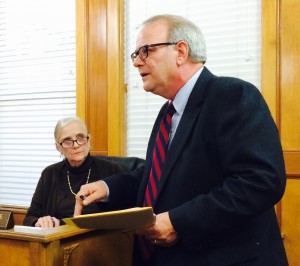Gibson’s Letter to City Points to More Siemens Shortfalls
December 22nd, 2014 by Joe Burgess Dear Mayor Rogers and Members of the City Council:
Dear Mayor Rogers and Members of the City Council:
We write to provide you with a status report on the subject matter. We encourage you to re-review our earlier correspondence on this subject.
You will recall that we wrote Siemens in behalf of the City on November 6, 2014, relative to several failures of Siemens’ earlier response to address the legitimate concerns of the City of Monticello respecting the project, and in which we called them to task for falsely accusing Mayor Maxwell of having directed that Sensus water meters be used instead of the Hersey meters specified by the contract.
On November 13, 2014, we received an e-mail response from Siemens’ lawyer, a copy of which is attached hereto as Exhibit “A”. Suffice it to say we are disappointed by this latest response of Siemens to the City’s demand that Siemens obey the law, and will explain further below.
(NOTE: the document that Mr. Gibson presented the city council had specific footnotes, and also refered back to his earlier letters to Siemens, which were also posted on MLive.)
Legally Required Letter of Credit, Cash in Escrow, Multiyear Surety Bond and/or Third-Party Credit Rating Agency Verified Investment Grade Corporation Guarantee of Promised Efficiency Savings.
You will recall that we have twice demanded in writing in behalf of the City that Siemens provide the Letter of Credit, etc., required by Ark. Code Ann. § 14-164-402(15)(D) to assure payment to the City of the efficiency savings promised by Siemens to the City in the contract for the water meters and lines. Siemen’s first response ignored the City’s demand, and when their hand was called on that by our second demand they have now decided to question whether that law applies to them without actually coming out and saying that they contend that the law does not apply to them.
Siemens also repeats their assertion that the City has offered nothing to suggest that Siemens is financially unable to meet the efficiency savings guarantee it gave to the City, but ignores (1) the City’s previous written request for financial information on Siemens Industry, Inc., and (2) the plain requirement of Ark. Code Ann. § 14-164-402(15)(D) that Siemens provide a Letter of Credit, etc., to assure payment to the City of the efficiency savings promised by Siemens to the City in the contract for the water meters and lines.
When one gets past the lawyer-speak argumentative statements of Siemens on this point, one sees that Siemens finally says that it will comply with the Arkansas law that requires it to post a Letter of Credit, etc., in favor of the City.
While that development is encouraging on the surface, Siemens qualifies its statement by saying that it will provide the Letter of Credit, etc., “without undue delay and, in any event, before the project enters the guarantee phase”.
Once again Siemens ignores the plain requirement of Arkansa law that the Letter of Credit, etc., financial assurances be provided to the City at the time the contract for the work is made and signed, see Ark. Code Ann. § 14-164-402(15), not after the work is completed. This only makes sense as, otherwise, the City would run the risk of Siemens being unwilling or unable to provide the legally required Letter of Credit, etc., until after over $10 Million in taxpayer money has been handed over to Siemens. The bottom line is that Siemens needs to obey the law now, not at some point later on.
We delayed issuance of this report to the City in hopes that Siemens would provide the Letter of Credit, etc., “without undue delay” as it said it would, but it has now been a month since Siemens stated that they would provide the Letter of Credit, etc., and nothing has been received from Siemens in this regard.
This is a serious matter that involves a clear and direct violation of Arkansas law on the part of Siemens respecting over $10 Million in taxpayer money. We recommend that legal action be taken in Court to rescind and cancel the contract for the failure of Siemens to post the Letter of Credit, etc., required by Arkansas law, and to seek recovery of the unearned portion of the $7 Million paid in advance to Siemens by the City on this project.
—————–
City’s Request for Statement of Reasons for Siemens Changing Type/Brand of Water Meters Required by Contract Specifications.
You will recall that in behalf of the City we wrote Siemens on October 22, 2014, requesting Siemens to provide a statement of reasons for changing the type/brand of water meters required by the contract specifications.
Siemens response (contained in its letter of November 4, 2014) contained no reasons for changing the meters specified by the contract except its now-known-to-be-false statement that Mayor Maxwell specifically requested that Sensus meters be used instead of the Hersey meters specified by the contract.1 We did, therefore, request information as to who decided that the Sensus meters were “equivalent” to the Hersey meters specified by the contract, and asked that Siemens provide copies of all documents that reflected the making of such a determination. That request for information is contained in our letter to Siemens dated November 6, 2014, a copy of which you already have.
Siemens’ response to that request for information is contained in its e-mail of November 13, 2014, a copy of which is attached hereto as Exhibit “A”. That response ignores the City’s requests for information and simply says that Siemens has “established” that it provided “equal” equipment. That Siemens’ statement is untrue on its face as Siemens has provided nothing to “establish” that the Sensus meter is “equal” to the Hersey meter specified by the contract.
We cannot imagine the City simply taking the “word” of Siemens that the Sensus meters are “equal” to Hersey meters specified by the contract, especially since this involves a multi-million dollar expenditure of taxpayer funds, and in light of the fact that Siemens has refused to provide any proof or justification for making such a major change in contract specifications – a thing done without obtaining a written and signed Change Order as required by the contract. In these circumstances it seems reasonable to suspect that the reason Siemens didn’t seek a Change Order is because it didn’t want a public City Council review of the matter which would have likely occurred in connection with any changing of the terms of the original contract.
Given Siemens’ refusal to provide any information supporting their contention that the Sensus and Hersey meters are “equal”, we requested the City’s engineering firm to do a comparison of the Sensus and Hersey meters. A copy of that engineer comparison analysis is attached hereto as Exhibit “B”. You will see from that analysis that the Sensus meters installed by Siemens are clearly inferior to the Hersey meters specified by the contract.
Our investigation also revealed that during the time of confusion following Mayor Maxwell’s death on March 10, 2014, that Siemens delivered a large number of Sensus water meters to a City warehouse. When it was noticed that the meters delivered were not the Hersey meters specified by the contract, City officials confronted Siemens’ representatives with the fact that the wrong meters had been sent. The Siemens’ representatives responded that the Hersey meters would not work with the computer software Siemens was installing in the water office, and that the City had no choice but to go with the Sensus meters. Notably, no Change Order was submitted by Siemens for signing by the City as required by the contract terms.
As you know, Siemens proceeded to install the Sensus meters, and, in our judgment, took advantage of the confusion following the untimely death of Mayor Maxwell to do what Mayor Maxwell would not permit them to do – change the meters from Hersey to Sensus.
You will also recall that Siemens tried to use “minutes” its representative took of a pre-construction meeting in January, 2014, to say that they discussed the change of meters with City officials. All City officials present for that meeting flatly say that there was no discussion of changing the contract specified Hersey meters to the Sensus meters Siemens wanted to install. Believing that Siemens was again making false statements in this matter, in our letter to Siemens of November 6, 2014, we requested Siemens’ representative Cory Carter to submit to an Arkansas State Police polygraph examination, and offered to have all City officials involved in the January, 2014, meeting also submit to polygraph examination. Siemens’ November 13, 2014, e-mail response (copy attached as Exhibit “A”) was to “decline” to participate in having a polygraph done of its man Cory Carter. Such speaks volumes.
In sum, our investigation reveals that Siemens has been less than forthcoming, if not outright dishonest, with the City about any alleged approval of a change of meters from that specified by the contract. It is also clear that Siemens did not comply with the specifications of the contract when it installed Sensus water meters instead of the Hersey meters specified by the contract.3 That is what is known in the law as a breach of contract for which legal action is authorized and in this case fully justified.
——————
Siemens’ Failure to Provide Legally Required Contractor Performance and Payment Bonds.
As you know, Siemens in its initial response4 stated that the Performance and Payment Bonds required by the contract and applicable law were delivered to the City in November, 2013, and provided copies of same with that response. We did, however, follow up that with a request for “originals” of these Bonds, and for information respecting delivery of same to the City in November, 2013.
Siemens’ e-mail response attached hereto as Exhibit “A” objects to having to produce “originals” of the Bonds, and, like in so many other instances, ignored the City’s request for information respecting the alleged delivery of the Bonds to the City back in November, 2013.
Given Siemens’ refusal to cooperate in getting the City “originals” of the bonds, we contacted the company that was supposed to have issued these Bonds, and were informed that they didn’t see a problem with issuing duplicate “originals” of the Bonds, but that it would have first check with Siemens.
A few days after that contact was made with the company that issued the bonds, the City received a certified mail envelope from Siemens’ man Cory Carter on November 24, 2014, and in that envelope were the “originals” of the Performance and Payment Bonds that Siemens had said were delivered to the City back in November, 2013. There was no transmittal letter or anything else in the envelope – just the “originals” of the Bonds. Attached hereto as Exhibit “E” is a copy of the envelope in which the originals of these Bonds were delivered by the U.S. Mail on November 24, 2014.
While certainly we are thankful for the City to have the “originals” of the Performance and Payment Bonds, it is of more than passing note that again we have Siemens making misrepresentations to the City — saying that these Bonds had been delivered to the City back in November, 2013, only to actually receive same a year later on November 24, 2014. It seems that almost at every turn Siemens is making misrepresentations of fact to the City. I mean, after all, Siemens could have said “we forgot” to deliver the required Bonds back when the contract was made, and most everyone would forgive such an oversight, but, instead, Siemens, and apparently its man Cory Carter, elected to lie about it.
Suffice it to say that Siemens and its man Cory Carter have lost most if not all credibility when it comes to the water project in Monticello.
—————————
Siemens’ Failure to Provide Manufacturer Warranties/Instructions on New Waters Meters, Etc.
Siemens’ November 13, 2014, e-mail response attached hereto as Exhibit “A” continued its earlier posture of refusing to go ahead and provide the manufacturer warranties on the water meters that had been installed.
That noted, after hours on November 24, 2014, Cory Carter of Siemens sent the City Clerk an e-mail requesting her, as opposed to Mayor Rogers, to sign-off on the City’s “acceptance” of “the system” (whatever that means). Attached to that e-mail was an acceptance document prepared for the Clerk’s signature as well as some additional documents that Mr. Carter described as “warranty documentation”. A copy of that e-mail, together with attachments thereto, is attached hereto as Exhibit “F” for your information and review.
While that e-mail did have what purports to be “warranty information” attached thereto, we remain concerned that the warranty document provided contains no identification of the water meters to which same pertains. There is no list of serial numbers attached to this documentation, nor is there any general listing of the water meters installed by Siemens in Monticello, and there is nothing from the manufacturer directed to the City that states that these warranties are being extended to the City. At best, what Siemens sent with that e-mail is nothing more than another exemplar (or example) of a warranty that might be extended to the City by the manufacturer.
It is important here to remember that the only warranties the City will have on these literally thousands of water meters will be the manufacturer warranties as Siemens has disclaimed making any warranties itself on the water meters in the contract.
We hasten to add that we strongly take issue with the statement in Siemens response e-mail of November 13, 2014, that “Siemens stands behind the products it supplies . . ..” That is simply not a true statement, and Siemens knows that it is untrue. The truth is that Siemens does not stand behind the products it supplies. As noted in our first letter to Siemens dated October 22, 2014, Exhibit “C” to the Contract, at pages 12-13, states:
“The manufacturer warranties are passed through to the CLIENT. See Attachment 4 for water meter warranty. SIEMENS is not warranting the physical products, only manufactures (sp) apply. Manufactures (sp) warranties will be in effect per the guidelines set forth by the manufacture (sp).”
(Emphasis Supplied). It is at best disappointing that Siemens would state something so untrue, and at worst amounts to another attempt of Siemens to misrepresent the facts in this matter.
Finally on this point, Siemens has yet to provide the City with the manufacturer instructions and recommendations that must be complied with in order for the City to enforce the efficiency and savings guarantee given by Siemens to the City in the contract. Paragraph 4.11 of the contract states:
“SIEMENS will have no liability or obligation to continue PASP Services or any Guaranteed Savings under the Performance Guarantee in the event the CLIENT fails to:
* * *
(c) Service and maintain all Equipment in accordance with the manufacturers’ recommendations . . ..”
It is, therefore, critical that Siemens provide the City with the manufacturer instructions and recommendations so that the City can comply with same and thereby be able to enforce the efficiency savings guarantee afforded to the City by the contract.
In light of the refusal of Siemens to provide manufacturer warranties/instructions to the City, we recommend that suit be brought to rescind and cancel the contract, and to seek recovery of the unearned portion of the $7 Million paid in advance to Siemens by the City on this project.
—————–
Defects/Problems with Water Meters Installed by Siemens
As noted above, after hours on November 24, 2014, Cory Carter of Siemens sent the City Clerk an e-mail requesting her to sign-off on the City’s “acceptance” of “the system”. Attached to that e-mail was an acceptance document prepared for the Clerk’s signature. A copy of that e-mail, together with attachments thereto, is attached hereto as Exhibit “F” for your information and review.
To receive that November 24, 2014, e-mail from Mr. Cory Carter was a surprise to say the least as a couple of weeks before that the City Clerk had personally given a list of 1,231 water meters with installation and other defects. We attach a copy of a spreadsheet done on the listing of meter defects/problems given by the City Clerk to Mr. Carter for your information and review. It is Exhibit “G” hereto.
As noted, there are 1,231 water meters with defects in installation or otherwise that need correction. That amounts to about 28% of all of the new water meters installed by Siemens. In other words, more than one-in-four meters installed need repairs. The City Clerk advises that she believes that some of the leak problems identified on that list were corrected by Siemens, but that City personnel are still in the process of attempting to determine the extent of efforts made by Siemens’ contractor to correct the defects/problems with the meters that were identified by City personnel as shown on the attached spreadsheet marked Exhibit “G”.
The best information we have at this time is that the vast majority of the defects and other water meter problems identified on the attached spreadsheet marked Exhibit “G” remain to be addressed by Siemens. We requested the City’s engineer to prepare and provide an estimate of the cost of fixing the identified problems with the water meters. A copy of that estimate is attached as Exhibit “H” hereto, and same reflects an estimated cost of $135,928.00 to correct the installation and other defects with the newly installed water meters.
Given the defect/problem rate (over 1 out of 4), one would think that Siemens would be busy fixing the defects/problems, but it is our information from City officials that Siemens withdrew its operations from Monticello just prior to the Thanksgiving holiday, and that it considers the water meter project to be “done”. That is certainly consistent with Siemens submission of an acceptance form to City officials for “the system” by its November 24, 2014, e-mail to the City Clerk, a copy of which is attached hereto as Exhibit “F”. It is also consistent with Siemens attempt in late November to have the City sign-off on the inventory of parts and other items being left by Siemens.
All this leads to the conclusion that Siemens has “left” Monticello without doing much if anything to correct the defects/problems with over a fourth of the waters meters installed by it. This leaves the City in a position of having to fix the defects/problems with the meters at its expense and to the tune of about $136,000.00.
We do, of course, recommend legal action against Siemens to cover the cost of repairing the defects/problems with the water meters.
—————–
Replacement of City Water Mains, etc.
We will make brief mention of the controversy surrounding the replacement of City water mains and related piping. As you know, it was clearly communicated to Siemens from the outset that the oldest water mains/lines in the “core” of the City (having the most leaks) were the ones to be replaced. Notwithstanding that specification, Siemens returned to the City with plans to completely replace the water mains/lines in the area designated Phase 3 which, notably, included little, if any, of the “core” area of the City. This was a complete surprise to the Mayor and Council, and caused a good bit of discussion to redirect Siemens to focus the water main/line replacement on the “core” area of the City. Further comment on this subject is deemed unnecessary given that the Mayor and Council are well aware of this additional disappointment with Siemens performance and the details of same. Our point is bringing it up is to remind the Mayor and Council of this further problem with Siemens.
———————–
Further Results of Investigation
Our investigation of this matter has revealed contacts between Siemens and the City began in the summer of 2011 when Siemens’ representative Tony Ardillo (and likely Mr. Dennington Moss) met with Mayor Maxwell. Then on October 7, 2011, Mr. Ardillo and a Dennington Moss made a presentation to the City Council to encourage the City to employ Siemens’ services to replace all of the City’s water meters and to replace a good bit of the City’s water mains and some fire hydrants. On information and belief, Mr. Moss’ interest in the matter related to his ownership in Faulkner Pipe of Greenville, Mississippi, from which Siemens would purchase the City’s water meter and piping needs.
At that October, 2011, Council meeting Dennington Moss stated that existing meter sample of 25 meters revealed a 53.58% accuracy rate. Then Siemens’ representative Tony Ardillo, obviously working in tandem with Moss, spoke and stated that the meter accuracy rate is “around 55%”. He went on to explain that new water meters with a much higher accuracy rate (say 98%) would result in a huge increase in the revenues derived by the City from its water department – enough to fund not only installation of new drive-by water meters but also the cost of replacing much of the City’s deteriorated water mains, piping and fire hydrants – and Mr. Ardillo also went on to say that Siemens would “guarantee” the additional revenue from the new water meters so that if the promised additional revenue did not occur that Siemens would write the City a check for the difference.5 Mr. Ardillo referred to this as a “performance based contract”.
Notably, 7 out of the 25 water meters Moss said were randomly pulled and tested were “dead” meters, or, in other words, meters that did not register any of the water running through them. Our investigation of this matter reveals that it is a practical impossibility for there to be any “dead” meters involved, much less 7 out of 25 meters. To believe otherwise is to believe that over a fourth (actually 28%) of all the City’s water meters were completely disfunctional. That is a practical impossibility given that every meter is read every month (so customers can be billed) and that any “dead” meters found during that process are immediately replaced on a month-to-month basis by City personnel.
In light of the above, it is beyond reasonable dispute that the Moss-Siemens’ “random” sampling of City water meters was not a valid sampling. At this point we do not know how so many “dead” meters made their way into the sample taken by Moss-Siemens, but we have learned that to properly handle meters selected for testing one must “cap” the meter so as to hold the water inside same for otherwise the meter goes dry and the rotating impellers that measure the water going through the meter tend to cease to function after becoming dry. Again, at this point, we do not know precisely why there were so many “dead” meters included in the random sample of meters Moss said he had pulled and tested.
It is important here to understand that the inclusion of such a large number of “dead” meters in the Dennington Moss sample causes the accuracy of the overall meter sample to decrease significantly; hence, the reason the overall testing result obtained by Moss-Siemens was just a little over half accurate (he reported to the Council that the City’s meters were only 53.58% accurate). To believe that the Dennington Moss test results are correct is to believe that the City was only billing its customers for only about half of the water delivered to them – a practical impossibility.
It being obvious that the Moss-Siemens test results were invalid and unreliable, another sampling of water meters was done by Siemens and the test results were issued on October 7, 2011. Our information is that Siemens was involved in both the earlier Moss sampling/testing and this second water meter sampling/testing. As with the first sampling/testing, this second sampling of meters were tested by the same company – Fluid Meter in Austin, Texas.
There were 103 meters submitted for testing this time, and the result was that the meters were 77.7% accurate – a 50% increase over the accuracy reported to the Council by Moss and Ardillo.
That noted, there were 12 of the meters submitted that were “dead” meters – again, a thing which significantly skews the accuracy rate test results to the downside. At this point it is not clear how a dozen “dead” meters made their way into this testing of City water meters. It may be that the meters pulled were not “capped” as mentioned above, but our investigation has revealed that it is likely because the folks who picked up the meters also picked up the “dead” meters that had been accumulated over time by City workers from their routine monthly replacement of “dead” meters.6 Those “dead” meters were kept in the same room as the meters pulled for the second testing, and it is our information that no City personnel were present when the second batch of meters were picked up by Siemens for testing.
Again it appears that someone noticed the large number of “dead” meters in the second sampling/testing, and a third sampling/testing was scheduled. This time Siemens was completely in charge of picking and pulling a random sample of 67 meters. The test results this time was that the City’s water meters were 95.2% accurate according to Siemens’ own documents (see Exhibit “I” hereto). Siemens’ problem with these test results is that this new accuracy rate would not economically justify replacing all of the City’s water meters. The brand new water meters were only guaranteed to be 98.5% accurate during the first year, and thereafter the guaranteed accuracy declined down to 96% over 10 years. See Page 23 of the Contract. In other words, if the City achieved the Siemens’ “guaranteed” meter accuracy in the first year (98.5%), the City would only be gaining a 3.3% improvement in the accuracy of its water meters – an improvement well within the statistical margin of error.
So what was Siemens to do – being faced with no economic justification and no substantial additional revenue to be achieved from replacing all of the City’s existing water meters. They did some figuring. As reflected by Siemens’ own documents, Exhibit “I” hereto, “Siemens project development team opted to combine the two test pools and results, [and] this resulted in a combined accuracy rate of 84.6%.”
Unfortunately, that third testing information of a 95.2% accuracy rate was not revealed to the City Council. Attached as Exhibit “J” hereto is a copy of the paper given by Siemens to the City Council that conveniently omits any direct report of the 95.2% accuracy rate from the third sampling/testing of the City’s water meters. They knew that would kill the deal, so they decided to average in the second sampling/testing results, improperly including 12 “dead” meters, to get that meter accuracy rate down to the 84.6% figure they needed to try and justify a complete replacement of all the City’s existing water meters. A quote from Mark Twain immediately comes to mind here – “figures don’t lie, but liars can figure”. That quote may seem a little harsh, but clearly Siemens has some explaining to do about withholding the 95.2% accuracy rate from the City Council.
The plot only thickens from there. Being unsatisfied with Siemens’ report of the testing results, at our direction City officials contacted Fluid Meter of Austin, Texas, to get copies of the actual results of all three (3) testings of the City’s water meters. Fluid Meter advised City officials that they would have to check with Siemens before providing copies of those test results. When the test results were not received in due time, the City Clerk wrote an e-mail to Fluid Meter again requesting copies of the test results. Fluid Meter responded, “We no longer have these reports.” A copy of that e-mail is attached as Exhibit “K” hereto.
Obviously, the actual Fluid Meter test results are being hidden from the City. This circumstance potentially passes this matter from the realm of a civil dispute to a criminal one, especially since Siemens falsely accused Mayor Maxwell of changing the type of meter to be installed, and since Siemens has “declined” to allow its representative Cory Carter to be subjected to a State Police polygraph examination. Clearly, the $10 Million involved ($7 Million of which Siemens already has in its possession) gives a motive.
—————-
Conclusion:
Our recommendations, in addition to those stated above, are:
1. Request the Arkansas State Police to open and conduct an investigation of this entire matter from beginning to end. This involves over $10 Million in taxpayer money.
2. Since Siemens has indicated a willingness to mediate the disputes, we recommend that the City should engage in a mediation with Siemens in an effort to terminate the contract and recover the unearned portion of the approximately $7 Million already paid by the City to Siemens as well as the damages suffered by the City in this matter (including such things as the cost of fixing the defective meters/installation). Doing a mediation may avoid what could be lengthy and expensive litigation in Court over the matters involved.
3. If Siemens refuses mediation, or if the mediation fails to reach a resolution of the disputes, we recommend that suit be brought by the City against Siemens for fraud, misrepresentation and breach of contract, and that both compensatory and punitive damages be pursued.
We will make ourselves available to answer any questions any of you may have respecting this matter.
Sincerely,
GIBSON & KEITH, PLLC
C. C. Gibson, III
———————————————————————-
1 The falsity of Siemens’ statement that Mayor Maxwell requested a change of the meters from Hersey to Sensus is dealt with in detail by our letter to Siemens of November 6, 2014, a copy of which was provided to you back at the time. We would additionally report that our investigation of this matter has revealed that MEDC Director Nita McDaniel happened to be in Mayor Maxwell’s office when Siemens representatives were attempting to get Mayor Maxwell to change from the contract specified Hersey meters to Sensus meters. Ms. McDaniel unequivocally states that Mayor Maxwell refused their request to change from Hersey to Sensus water meters.
2 Here we would note that at the City Council meeting of May 16, 2013, Siemens’ representative Tony Ardillo bragged on the Mueller system (also known as Hersey meters) to Mayor Maxwell and the Council, and stated that Mueller system had just been selected in the large city of Jackson, Mississippi, and was being used “all around the country” as a meter system.
3 It would be noted that prior to our involvement in this matter that the City was already expressing its disagreement with installation of Sensus meters instead of the Hersey meters specified by the contract. One example is the October 6, 2014, certified letter written by the City to Siemens, a copy of which is attached hereto as Exhibit “C”. While the City got a response letter from Siemens (which is attached hereto as Exhibit “D”), it only stated that Siemens “will review the content of the [City’s] letter and will address each item in a timely manner.” No further response from Siemens has ever been received by the City. Thus, once again has Siemens ignoring requests from the City.
4 Seimens’ letter of November 4, 2014, a copy of which you already have.
5 While there were also statements about the City saving money from having less leaks from the City mains, and saving on meter reading labor costs, and such, Mr. Ardillo was clear in stating that the “revenue of the meters will drive the project.”
6 We understand from City personnel that they keep the “dead” meters accumulated from their monthly routine replacement of “dead” meters, so that they can eventually have enough to interest a scrap metal merchant. It is also our information that the monthly replacement of “dead” meters would approximate about one per month – that one might go several months without a “dead” meter, and then have a couple in one month.
Choose another article
Newer article: Gibson Recommends State Police Investigation on Siemens Water Contract – “Think They’ve Left Town” – Video
Older article: Lost & Found: Backpack



























































